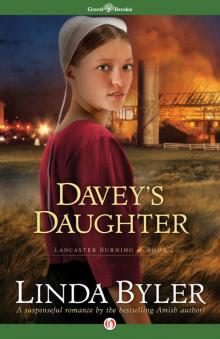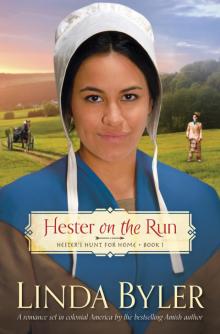- Home
- Linda Byler
Hester on the Run Page 2
Hester on the Run Read online
Page 2
Without her cap, her hair was soft and wavy, but she always pulled it back into a tight bun, jabbing combs sharply into the tight coils on the back of her head.
It was shameful to wash one’s hair too often, a sign of pride. So she didn’t tell Hans, figured he needn’t know, for he was strict in some ways where she was concerned.
If her friend Naomi wore a new green shortgown, and she expressed her wish for fabric of such a beautiful hue, he would become quite angry, grasping her arm and giving it a small shake, saying she was going against God’s will, being consumed by the lust of the eyes. So she learned to satisfy any desire for beauty when he was blacksmithing.
Once, she dyed a length of plain linen fabric with the juice of pokeberries, turning it into a delightful hue between purple and pink. She was so pleased with the results that she set about immediately sewing a curtain for the east window beside the fireplace. Wouldn’t it turn into the color of wild roses when the sun arrived over the treetops, the rays piercing through the brilliant fabric, infusing the house with color?
Her disappointment was crushing when Hans said he would have none of her worldliness, ripped it off its rod, and took it away. She never found out what he had done with her handiwork, until she helped him shovel manure the following spring and discovered slivers of fabric that had once been brilliant, like the rubies Hester Elizabeth had told her about.
The stone in her chest had caused her great pain, but it had dissolved as she forgave her husband and berated herself for being so prone to cave in to her worldly desires. It was the way of it, being Amish.
But now, with little Hester, Hans changed completely when it came to dressing her as an Amish baby. He came home from Reuben Hershberger’s with a swatch of blue linen the color of a bluebird’s plumage, so blue it was a sort of purple. Smiling, his eyes alight, he asked Kate to sew a little dress for Hester. They would be taking her to church on Sunday.
Pleased, and convinced he would allow her prettier fabric, Kate set about sewing the small garment, her needle weaving in and out with tiny stitches that would hold for years.
She sewed a row of tucks in the sleeves that could be taken out to lengthen the sleeve as she grew. Around the hem along the bottom of the shirt, she did the same, thinking how this beautiful little dress could be worn for quite some time. She made a small muslin cap for her, too, much like her own. They tried the cap on Hester and laughed together when her thick, glossy black hair refused to remain beneath it.
Kate darned Hans’s socks, but when a pair was no longer worth patching, she turned them into small black socks for Hester. Hans was so happy about her thriftiness, he told her that together they would turn this little homestead into a productive farm, a real place in the Amish community.
The gentle summer rains made her garden a lovely picture of growth, the pole beans climbing up over the crooked poles they tied together at the top, a tripod of support for the fast-growing vines.
Onions grew in straight rows, their tops reaching for the sky like scrawny fingers. Beets grew large and heavy, their red-veined leaves spread luxuriantly between the rows, adjacent to the field of corn and tobacco.
Kate kept the weeds at bay with endless hoeing. Every morning, before Hester awoke, Kate was in the garden, hoeing, collecting bugs, and drowning them in hot tallow, following well the ways of her mother.
She fed kitchen scraps to the chickens. She gathered the eggs and washed them, storing them in woven baskets in the cold cellar Hans had built behind the house. He’d take any extra eggs along when he made his horseshoeing calls and then put any coins he received beneath the floorboards under their bedstead.
Somehow today she couldn’t shake a disgruntled feeling about the brilliant blue dress for Hester. She had been delighted, reveling in the sewing of it, bending over her needle and thread with a gladness that was hard to explain. Why now, here washing the large, brown eggs, did this feeling creep over her?
Was it jealousy? Longing to have one of her own? Quickly, she scolded herself, muttering aloud. How childish. So shameful. Of course she must stop any such thoughts that crept in. They were of the devil.
Hans was the best father she had ever seen. How many times had she helped her friends with their screaming babies, or injured toddlers wailing out their indignities, and watched their husbands in animated conversation, oblivious to their wives’ frustration as they struggled to take care of all the babies and young children?
No, Hans was exceptional, and it was only her own childish selfishness that brought on this gloomy foreboding. Or was it her woman’s intuition?
CHAPTER 2
THE PENNSYLVANIA FOREST STRETCHED BEFORE them like an endless green sea, the trees as restless as the ocean currents, tossed about by a strong wind, setting the treetops into a sort of constant, ever-changing dance.
Hans urged the dependable driving horse, Dot, into an easy walk. The heavy leather strap, called the britchment, dug into her haunches as she leaned into it, working hard to hold the cart back, to keep it from careening down the steep, rocky incline. The road was barely visible because of the washouts from the thunderstorms of late spring.
Dot lowered her head, picking her way easily between the ruts as the cart bumped and swayed, sending Kate’s shoulder bouncing against Hans’s. She relinquished her hold on Hester, ignoring the ache in her elbow as she held the sleeping infant inside her brown shawl.
The morning was crisp and cool, the sun lighting up the deep greens into many various shades, from near black to joyful lime green. It was a bit chilly, with the wind whipping the small branches over their heads, turning the leaves inside out, worrying them frantically with each fresh gust.
Hans laid a thick hand on the top of his black felt hat and pushed down, ensuring the headgear’s tight hold on his head, then turned to look at his wife. He could see nothing but the wide front of her cap, her face hidden behind its broad front piece. He knew her mouth would be set in a straight line of endurance, unwilling to admit how weary she was. They had come about three-fourths of the way, probably twelve miles, and her shoulders would be aching, he knew. They were on their way to church services, being held that morning in the home of Amos and Mary Hershberger, a distance of sixteen miles from home.
Soon the forest would give way to an open area, the fields and pastures having been cleared by Amos and his sturdy sons. The cart lurched, rocking from side to side as Dot picked her way carefully down the incline. When they came to a level area, the sun’s rays changed the light to a yellow-tinged hue, a constantly moving play of light and dark colors. The road became a carpet of pine needles now, pierced only by a few wild blackberry bushes springing up from the acidic soil beneath the ancient pines.
Kate breathed in deeply, savoring the sharp odor of pine gum. Her eyes followed the movement of a red squirrel, chirring at the invaders from his perch on a low branch. Her full-fronted cap effectively obscured her side vision, which was perhaps the reason for its wide rim. The eyes of women should not wander or seem bold or brazen, but should be kept lowered in humility.
Today, Kate would need to pray for humility. Already her heart was thumping, her breath quickening at the thought of carrying her perfect child into the house, the women rushing to see, the gasps of admiration.
Hester was hers, all hers. Kate’s moment of glory had come. They rode on in silence, swaying together in the cart. Hans had suggested the cart, because of the distance. It was lighter and easier on Dot.
Kate had given her consent, but after twelve miles, her back ached horribly, her elbow felt frozen into place, and she resented Hans’s lack of forethought. They should have taken the box wagon, but Hans didn’t want to exhaust Dot.
Soon, from the money he’d been saving from his horseshoeing, they could afford four new wheels. He would make a lighter cart himself, and it would be a fine one, she knew.
Kate turned her head, straining her neck to see the Stephen Fisher homestead. She was curious about Barbara’s garden, the an
imals. Had their Belgian mare given birth? Barbara had spoken of the upcoming event in hushed tones two weeks ago.
The leaves on the trees obscured much, leaving Kate with unsatisfied curiosity, but since Hans did not speak as they drove past the Fishers, Kate thought it best to hold her words.
It was, after all, the Sabbath, the day of holiness. Let your ya be ya, your nay be nay, always, but especially on the Lord’s Day. Her thoughts were to be on spiritual matters, not wondering about her neighbors’ material worthiness.
Kate tugged at her flat hat, pulling it farther front, as if the width of it might ensure heavenly thoughts. She could not resist one furtive, backward glance, however, and much to her great triumph, she caught sight of a thin, blond, long-legged colt cavorting among the tree stumps in the pasture. So the mare had her colt. Kate smiled, well hidden from her husband’s steady gaze.
“Oo-oo-ah.” Hans began a slow chant, a bit above a humming sound. So, he meant to sing fore (be the song leader). He would lead a hymn today. That was good. Kate was glad. Hans had a clear voice that rose and fell like deep, chiming bells, a rich and full baritone. He was a good song leader, not one who stumbled and other men had to come to rescue, the way it was for some who were less talented.
The bundle on her lap began squirming, then tugging at her arms and heaving, before letting loose with a fine howl.
Lifting the flap of her shawl, Kate fumbled to loosen the baby’s shawl, wrapped securely about her head, as the howls became more insistent. Shocked to find her beautiful baby’s face bathed in sweat, the blanket around her neck already moist with it, Kate hurried to loosen the pins that held the heavy garments too snugly around her.
Frightened, Kate kept her head lowered, as Hester emitted stronger cries, her outrage building at being kept waiting.
Hans’s singing stopped. “Can’t you feed her?” he asked gently.
“I don’t know how I would in this rocking cart. She was a bit too warm, I guess.”
“Sit her up. Let her get some air,” Hans instructed.
Kate wouldn’t think of it and told him so. If a child perspired and then became exposed to frosty air, he or she could catch a cold. But when the indignant child’s cries became quite frantic, Hans stopped the mare, told Kate to get her some milk now, because he could hardly see how she could survive under that heavy shawl.
Obediently, Kate tried to feed her the cold cow’s milk, sitting beneath a great pin oak in the new grass by the side of the road, but Hester would have none of it. She turned her head and screamed her refusal. Kate lifted her to her shoulder, thumped her back gently, and tried again, to no avail.
Hans was becoming anxious, and the baby continued wailing. Kate wrapped her back into the shawl, stuck her unceremoniously beneath her own, climbed back into the cart with her eyes lowered, and rode the remaining few miles to church services under the fog of her husband’s disapproval. There was nothing she could do. Why couldn’t he see that?
When they finally reached their destination, Kate was exhausted from clinging to the crying infant, her nerves shattered by feelings of inadequacy. What had happened? Had their life been too perfect? Everything had gone so smoothly, but their first venture to take Hester away had turned into a nightmare.
She turned her head to search Hans’s face, alarmed to find his eyes set straight ahead, the brows lowered over them as if he was enduring the misery of the infant all by himself. Did he really love the child so much?
Kate was reduced to carrying the still-crying infant into Amos and Mary Hershberger’s well-built house. Scurrying swiftly, she acknowledged helping hands gratefully, relinquishing Hester into Mamie Troyer’s ample, old arms, who clucked and fussed and announced in stentorian tones that this baby was au-gvocksa (all tense and tight). Mamie proceeded to unwrap her, every head bending to watch as she lifted the baby.
Kate’s dreams of Hester’s first entry to church were dashed. Her beautiful child was red and perspiring, her eyes swollen from her painful crying, her little red mouth maneuvering grotesquely as harsh, nerve-jangling noises burst from it steadily.
Hester’s beautiful new blue dress was soaked with saliva and perspiration, a dead giveaway about Kate’s failure as a mother.
“Too warm!”
“The child is sweating.”
“She’ll get a cold, sure.”
Clucks of pity, disapproval, wonder, whatever the reason, all served their purpose well, adding weight to Kate’s utter sense of failure. She should have known better.
They all watched with approval as Mamie grasped the baby’s left arm and right leg, bringing them together with a quick solid thump, producing howls of pain and fright. She did the same to the opposite arm and leg, then laid the child on the bare planks of Mary’s kitchen table. She began to massage the tiny rib cage and underarms, as the baby’s cries increased yet again.
Kate stepped forward anxiously, but Mary Hershberger caught her arm. “Let Mamie alone. She knows what she’s doing.”
Mamie’s fat fingers kept moving up and down, while Hester arched her back and screamed. Just when Kate thought she would go mad, Mamie tugged the blankets, set the baby’s arms by her side and wrapped her as tightly as possible, handed her to Kate and told her to “Burp her good.”
Hester was limp as a rag doll, her face pale and exhausted, soft rhythmic burps coming up quite regularly. Kate’s heart swelled within her as she held Hester close, thinking she might die of a broken heart if she let her loose, even a bit. Poor, poor baby. Precious child.
What a talking, then! These housewives may have been in Pennsylvania, but they spoke German endlessly the minute they were finally in the company of other women who knew the language, hungering to hear and to be heard.
“It was the cart ride. If you take a baby out before six weeks, they get an awful ache. The muscles are growing, and they ache. It’s very painful. When I rub along her sides, it loosens them, and the burps can come up. Then the pain goes away,” Mamie said, watching Kate’s face intently. Kate only nodded, too close to tears to answer.
Barbara Fisher leaned her head to one side and said she’d never seen a prettier little one. That was met with a smile of approval from Mamie, and a bitter, awkward look from Hans’s mother, followed by, “She’s an Indian.”
The women drew in their breaths, stiffened their shoulders, and crossed their arms as Rebecca’s uncontested disapproval settled around them, poisoning the atmosphere with her taut words dripping toxins. Mamie gave Rebecca a level took, then said good-naturedly, “Well, Kate couldn’t leave her by the spring to die. That would be murder, wouldn’t it?” Murmurs of assent rippled through the kitchen, leaving Rebecca isolated, but only for a moment.
“What do our English neighbors say? ‘The only good Indian is a dead one.’”
The women gasped in disbelief and raised their fingers to their mouths. What boldness!
Mamie went right home and told her husband, Obadiah, what Rebecca said right there in the kitchen on a Sabbath morning. Obadiah told John Lantz, the bishop, and he said the statement bordered on hate, and that woman would have to be stopped.
Mamie took a secret glee in seeing Rebecca having to confess her sins in church two weeks later, that spiteful woman, talking like that about her own daughter-in-law, and the Amish being a loving, nonresistant people, at that. It was surely the end times, when a woman spoke such words. The Lord would not tarry very long anymore.
Church services were held in the barn, with straw scattered along the floor, the wooden benches set on top. Pigeons cooed from the rough-hewn rafters that were held together with wooden pegs, and shafts of dusty sunlight shimmered between the slats of a window set up under the eaves.
The horses stomped their feet and rattled their chains, while the slow-moving sound of the German songs rose and fell, as the congregation sang from the Ausbund, thick, little songbooks, each book shared by two members throughout the barn. The hymns had been written by Anabaptist prisoners, foreparents of the A
mish held captive at Passau on the Danube River in Germany.
Kate sat on a bench alone, her baby settled in the house between two rolled up blankets on Amos and Mary Hershberger’s bed. She’d go check on her, if need be, but now, she wanted to remain seated, her voice chiming in with many others, her heart swelling with praise to God, for Hans, for Hester, for her life here in America, for the freedom to worship God the way they chose.
And now she had Hester, a baby of her very own, and her battle to fight the good fight of faith was over. Likely she never would conceive, but that was God’s will. It was all right. She had her beloved daughter. And Hans loved her every bit as much as she did.
When John Lantz rose to preach, she was reminded of the ancient patriarchs, Abraham, Moses, all of them. John was tall and wide, with bushy white hair springing into riotous curls, his beard circling his face, a bib of the same curling white hair, wagging up and down as he spoke.
His eyebrows were still dark gray, giving him an austere demeanor, as if the lowering of those bushy brows could decide your fate, godlike. His voice was low, well modulated in the beginning, but as he continued speaking, it rose to an emotional crescendo, instilling into the congregation the need to repent of their sins, that the day of the Lord was fast drawing nigh.
Kate sat, worrying her lower lip with her fingers, thinking how very much she hoped Hester could grow into a healthy little girl yet, before the Lord would return in the clouds with hundreds of thousands of his angels. She wanted to sew her bright dresses and soft white nightgowns and braid her jet-black hair. She wanted to laugh with her and hear her speak and teach her the ways of the farm and the surrounding forest. But was that carnal thinking? Her own worldly views? She wished she had her mother or her sisters to confide in, but she didn’t. They had all remained in Switzerland the day John Zug and his parents boarded the Charming Nancy and made the perilous journey across the heaving waters of the Atlantic.

 A Second Chance
A Second Chance Lizzie's Carefree Years
Lizzie's Carefree Years The More the Merrier
The More the Merrier Love in Unlikely Places
Love in Unlikely Places Running Around (and Such)
Running Around (and Such) Wild Horses
Wild Horses Lizzie Searches for Love Trilogy
Lizzie Searches for Love Trilogy Lizzie and Emma
Lizzie and Emma Little Amish Matchmaker
Little Amish Matchmaker The Witnesses
The Witnesses The Healing
The Healing Home Is Where the Heart Is
Home Is Where the Heart Is Fire in the Night
Fire in the Night When Strawberries Bloom
When Strawberries Bloom Little Amish Lizzie
Little Amish Lizzie Which Way Home?
Which Way Home? The Homestead
The Homestead Sadie’s Montana Trilogy
Sadie’s Montana Trilogy Davey's Daughter
Davey's Daughter Hester on the Run
Hester on the Run Disappearances
Disappearances Big Decisions
Big Decisions Becky Meets Her Match
Becky Meets Her Match Hope on the Plains
Hope on the Plains Christmas Visitor
Christmas Visitor